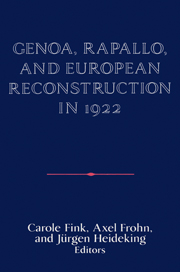Book contents
- Frontmatter
- Introduction
- 1 Beyond Revisionism: The Genoa Conference of 1922
- 2 The Genoa Conference of 1922: Lloyd George and the Politics of Recognition
- 3 A Rainy Day, April 16, 1922: The Rapallo Treaty and the Cloudy Perspective for German Foreign Policy
- 4 Reparations in 1922
- 5 Germany and the United States: The Concept of World Economic Interdependence
- 6 American Policy Toward Debts and Reconstruction at Genoa, 1922
- 7 French Plans for the Reconstruction of Russia: A History and Evaluation
- 8 The Oil Problem and Soviet-American Relations at the Genoa Conference of 1922
- 9 Italy at the Genoa Conference: Italian-Soviet Commercial Relations
- 10 The European Policy of Czechoslovakia on the Eve of the Genoa Conference of 1922
- 11 The Genoa Conference and the Little Entente
- 12 The Role of Switzerland and the Neutral States at the Genoa Conference
- 13 The Genoa Conference and Japan: A Lesson in Great-Power Diplomacy
- Maps
- Appendix
- Bibliography
- Contributors
- Index
1 - Beyond Revisionism: The Genoa Conference of 1922
Published online by Cambridge University Press: 05 January 2013
- Frontmatter
- Introduction
- 1 Beyond Revisionism: The Genoa Conference of 1922
- 2 The Genoa Conference of 1922: Lloyd George and the Politics of Recognition
- 3 A Rainy Day, April 16, 1922: The Rapallo Treaty and the Cloudy Perspective for German Foreign Policy
- 4 Reparations in 1922
- 5 Germany and the United States: The Concept of World Economic Interdependence
- 6 American Policy Toward Debts and Reconstruction at Genoa, 1922
- 7 French Plans for the Reconstruction of Russia: A History and Evaluation
- 8 The Oil Problem and Soviet-American Relations at the Genoa Conference of 1922
- 9 Italy at the Genoa Conference: Italian-Soviet Commercial Relations
- 10 The European Policy of Czechoslovakia on the Eve of the Genoa Conference of 1922
- 11 The Genoa Conference and the Little Entente
- 12 The Role of Switzerland and the Neutral States at the Genoa Conference
- 13 The Genoa Conference and Japan: A Lesson in Great-Power Diplomacy
- Maps
- Appendix
- Bibliography
- Contributors
- Index
Summary
Revisionist sentiment against the Paris Peace Treaties erupted even before the ink was dry. The victorious wartime coalition quickly unraveled, starting with Keynes's vicious attacks and America's defection, France's insistent demands for enforcement and Britain's vacillations, Italy and Japan's dissatisfaction and dissociation, and the small East European client states' factiousness and rivalries. The defeated Reich used all means at its disposal to protest the injustice of the Treaty of Versailles; it applied diplomacy and propaganda to widen breaches among the Allies, appeal to the sympathy of the neutral nations, and, while warning of the menace of bolshevism, explore a future Berlin-Moscow entente to counterbalance the Allies' domination of Europe. Lenin's Russia and the organs of the new Communist International militated against a peace settlement that had ringed Moscow with hostile regimes. The former wartime neutrals - the Netherlands, Scandinavia, and Switzerland - blamed the postwar inflation and economic contraction on a peace settlement that had disrupted traditional commercial, manufacturing, transport, and communications systems and erected onerous barriers. The specter of huge Allied war debts and enemy reparations payments, of heavy military expenditures and mounting reconstruction costs, of high taxes and tariffs, and of growing restiveness in the colonial world, all dampened the prospects of European economic recovery.
- Type
- Chapter
- Information
- Genoa, Rapallo, and European Reconstruction in 1922 , pp. 11 - 28Publisher: Cambridge University PressPrint publication year: 1991
- 2
- Cited by

